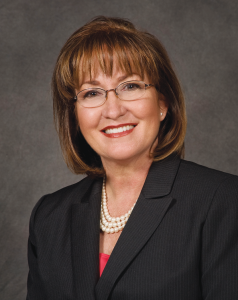A Proven Leader
Teresa Jacobs’ time as Orange County’s mayor is winding down, but her impact will be felt for years to come.
 Part of Greater Orlando’s political landscape for nearly two decades, Teresa Jacobs has served as Orange County’s mayor since 2010—and she did such a good job from the get-go that she wound up running unopposed in her 2014 reelection bid.
Part of Greater Orlando’s political landscape for nearly two decades, Teresa Jacobs has served as Orange County’s mayor since 2010—and she did such a good job from the get-go that she wound up running unopposed in her 2014 reelection bid.
Term limits preclude her from making a third mayoral run, but Jacobs has helped our community grow in countless ways since she first took office, including playing a key role in highly visible improvements like the Dr. Phillips Center for the Performing Arts and Orlando City Stadium. She’s also worked hard to improve pedestrian safety and tackle our affordable-housing crisis, providing strong leadership throughout.
Accordingly, it should come as no surprise to hear that she’s not quite ready to rest on her laurels—making us all the more honored that she made time for this exclusive interview.
ORLANDO FAMILY MAGAZINE: What are some of the more positive changes you’ve seen in our area during your tenure as Orange County’s mayor?
TERESA JACOBS: I would say since I first ran [for county commissioner] in 2000, I’ve seen some major cultural changes in our community. [At] least on the west side of town where I first ran, it wasn’t as welcoming to newcomers as it is today. My personal experience, when I decided to run and I had lived here for nine years, everybody said: “Oh my gosh, you’re a newbie. Nobody will elect anybody who’s been here less than 20 years.” Of course, I ran and got elected, but I think that attitude is largely gone.
I get excited when people move here from other places. I always tell them, “Check back with me in six months and tell me if I’m right or not, that this is the most one of the most open, friendly, welcoming communities you’ve ever moved to.” And overwhelmingly, I get the answer, “Yeah, you’re absolutely right.” If you want to get involved and be a part of a community, this is absolutely the place to be. And I would not have said that 17 years ago.
Another thing that I think has changed dramatically is the ownership in this community. I can remember when Linda Chapin was mayor in 1996. She was having these forums, trying to figure out how to get people to put down roots and feel invested in this community. I don’t see that as an issue anymore. I think people move here and pretty quickly feel that sense of community, and I think it ties back in again to us just being a very welcoming, open community.
I think our diversity has expanded dramatically in the past 17 years, and diversity at all levels. We have a very young population, which probably helps with our very adaptive culture, but you look at our ethnic diversity, you look at our religious diversity, you look at diversity of thought, and you look at our LGBTQ community and how well incorporated and supported they are here. I just think we’ve become a much more eclectic, diverse, compassionate, cool place to live in 17 years.
Add the venues that we have, the fact that we have a soccer team, we have [the Dr. Phillips Performing Arts Center]—you look at those types of opportunities for culture, for arts, for restaurants. We’ve grown up a lot in a positive way, but we still remain this small-town, close-knit kind of community.
OFM: Which of your mayoral accomplishments to date are you most proud of, and why?
TJ: That’s a tough one, because honestly, I can’t say that there are any accomplishments that I own. As a community, we’ve come together to figure out how to fund the Performing Arts Center. The county played a huge role, but so did the nonprofit and the private sector, and some amazing contributions from individuals in our community. But certainly, I think looking back 20, 30, 40 years from now, the performing arts center is just a game-changer for our community in so many regards.
I think in terms of transportation projects, it would be the completion of the beltway. That was something, when I came into office, that wasn’t funded. I pushed for a full funding agreement with the state, and we will have that entire beltway completed by the year 2021, 2022. I think that’s going to be a very positive thing.
There’s a lot of tough issues we’ve taken on. Challenges like youth mental illness—something I don’t think much of the country has focused on. Affordable housing is a challenge that we’re still tackling. Heroin is a challenge across the nation. I’m very proud of the way all facets of our community came together to come up with some very strong, solid recommendations that we’re implementing.
It would be hard to identify a single accomplishment, but I don’t think any one person in our community owns the right to say that they’ve accomplished something. It’s really done by the community in a collaborative fashion.
OFM: On the flip side, what have been some of the largest challenges you’ve faced since taking office?
TJ: Definitely a big challenge for our community right now is affordable housing. It’s a challenge nationwide, but we are one of the lowest-ranking communities or regions in the nation when it comes to providing housing for the very low-income families in our community. So, that is a challenge that as a region that we’re working together with Osceola [County], Seminole [County] and the City of Orlando to try to figure out the best way to ensure that housing, especially rental housing and apartment complexes, gets built and is offered at a level that our working families can afford.
The heroin epidemic also continues to be a challenge. We’re still seeing increases in deaths and arrests, but not at the same rate as some of our peers, because, I think, of the efforts that we’ve undertaken, but it still remains a huge challenge to this community and to the nation. I would say that those are probably two of our biggest challenges.
OFM: Now that you’re more than halfway through your second term, what are some of the most pressing items remaining on your mayoral to-do list?
TJ: A couple of things that we’re hard at work right this minute: About two years ago, I rolled out an INVEST [in Our Home Life] initiative. It’s a $300 million infrastructure improvement program. One of the priorities under that is pedestrian safety. It seems like barely a week goes by that I am not just devastated to hear of a young person—just last week, it was a teenager pushing his mother or grandmother across the road in a wheelchair, who was killed due to a pedestrian casualty. So, pedestrian safety is something that we’re working hard at, but we have a lot of work to do in that area.
[The second is] affordable housing. That’s a really tough issue and it’s going to be tough to deal with at the local level without support from the federal government. These are two ongoing initiatives that I hope to make some meaningful progress on before I leave office.
OFM: Greater Orlando has enjoyed strong growth over the past decade or so, but we’re not done yet. What are some other improvements you’d like to see in the coming years?
TJ: Boy, we’ve got so much, and we’ve done so much. I’ve often joked—we have a community that loves sports; it’s been amazing, the reception and the fanbase that’s developed already for soccer—that we’re one of the few communities that has a major league-style stadium and no NFL team. It’s a longshot for this community, but that would certainly be pretty awesome to have our own NFL team.
Other things that we’re missing. Hmm, boy, it’s so hard to say. I moved here in 1991 … and I have seen so much change and almost all of it I would say positive, with the exception of traffic congestion, and dealing with road construction is always frustrating. But, it’s all been so positive, it’s hard for me to point to something that we’re missing. I could’ve told you a million things in 1991 when I moved here, but we’ve grown up a lot in a lot of positive respects.
OFM: Our community is also one of the most tolerant in the nation, exhibited not just by the way we pulled together in the wake of the Pulse shooting, but by day-to-day life. What are some of the factors that you feel contribute to Greater Orlando being so welcoming?
TJ: That’s a great question. I’m not sure that most people realize, but we have a pretty young average age. The average age of a citizen in Orange County is about 34, and that’s actually younger than Miami. I think that helps with it. I think youths are more open and receptive, and there’s something that seems to happen to us as we get older. That’s why I spend as much time as I can with my kids that are in their 20s.
I think it’s also that, [because of] those social connections that I mentioned and the relationships that get formed in this community, it’s almost impossible to live in this community in isolation of diversity. I think that people naturally get comfortable with people that they spend time with. I think the openness of our LGBTQ community has helped tremendously. You can’t work or live in Orange County and not come to know somebody and know them well that maybe years ago you never would have known what their sexual preference was, and now you realize that in the end, we’re all so similar, that the differences are so small compared to the similarities. So, I think that getting to know people and living in a community that is so friendly, has just become an almost infectious quality of our culture.
OFM: Although you became a civic leader, you’re not a native Greater Orlandoan; what first brought you here?
TJ: My husband I both grew up in South Florida. We moved to Atlanta with the idea of spending two years there. We were young and idealistic and thought we could get a job and establish our careers in two years—I look back and continue to laugh about that.
Ten years later, we discovered that my husband’s father was diagnosed with a terminal form of cancer, so we decided at that point that we wanted to do everything we could to get closer to home. I was pregnant with our fourth child, and my husband started pursuing job offerings here in Orlando, and we moved down here. We were fortunate. It turned out that his dad was misdiagnosed, and we had three more wonderful years with his dad before we ultimately lost him. But we got to spend an enormous amount of time with him and my parents because of the decision to move closer to home.
So, that was it. The driving force was getting back closer to what we then considered home, which was South Florida. Home for us now is Orlando and has been for 25 years, and this will always be home. Nothing has ever compared to living here.
OFM: What are some of your favorite ways to unwind from the stresses of your job?
TJ: I love being at home. I get home, and my husband and kids will want to go out—my home is kind of my sanctuary. We have bees that we keep; we have three beehives in the backyard. We have a butterfly garden and a vegetable garden [that I spend time in]. We have two puppies that I love, so, I don’t know—just being mom and being wife, and just being calm.
OFM: What are some off-the-beaten-track attractions that you’d encourage visitors to experience in Orange County?
TJ: I would encourage anybody who comes here, if they haven’t been on an airboat ride, to go out and experience the natural environment we have. And we have wonderful—our chain of lakes is just incredible, so I would say boating on our lakes, kayaking [and] airboat riding. And then we have amazing farmers’ markets in places like Winter Garden and Winter Park and Mount Dora—all those places are really just quaint, neat places to spend time.
OFM: You ran unopposed in 2014, indicating that a strong majority of constituents think you’ve been doing a great job. What are your post-mayoral plans looking like?
TJ: I’m still trying to figure out what I’m going to be when I grow up. (Laughs.) I say that jokingly—my dad once told me that when he was about my age. I absolutely love what I’ve had the privilege and opportunity to do as mayor. I’ve got about 16 months left. Every day, I come to work focused on, “What can I do today?” So, I haven’t given it enough thought.
I would hope that whatever I’m able to do after I leave office here, term-limited, would be to contribute in some way to this community. I would sure hope that at some point one of those four children of mine would deliver some grandchildren—I really look forward to that phase of life. But in terms of whether I would consider running for another office, I haven’t given that any real thought. I do know that I have really enjoyed the opportunity to be engaged and have found it so rewarding, that I can’t imagine that I’ll ever completely step away from being involved in the community.
An abridged version of this article originally appeared in Orlando Family Magazine’s June 2017 issue.








